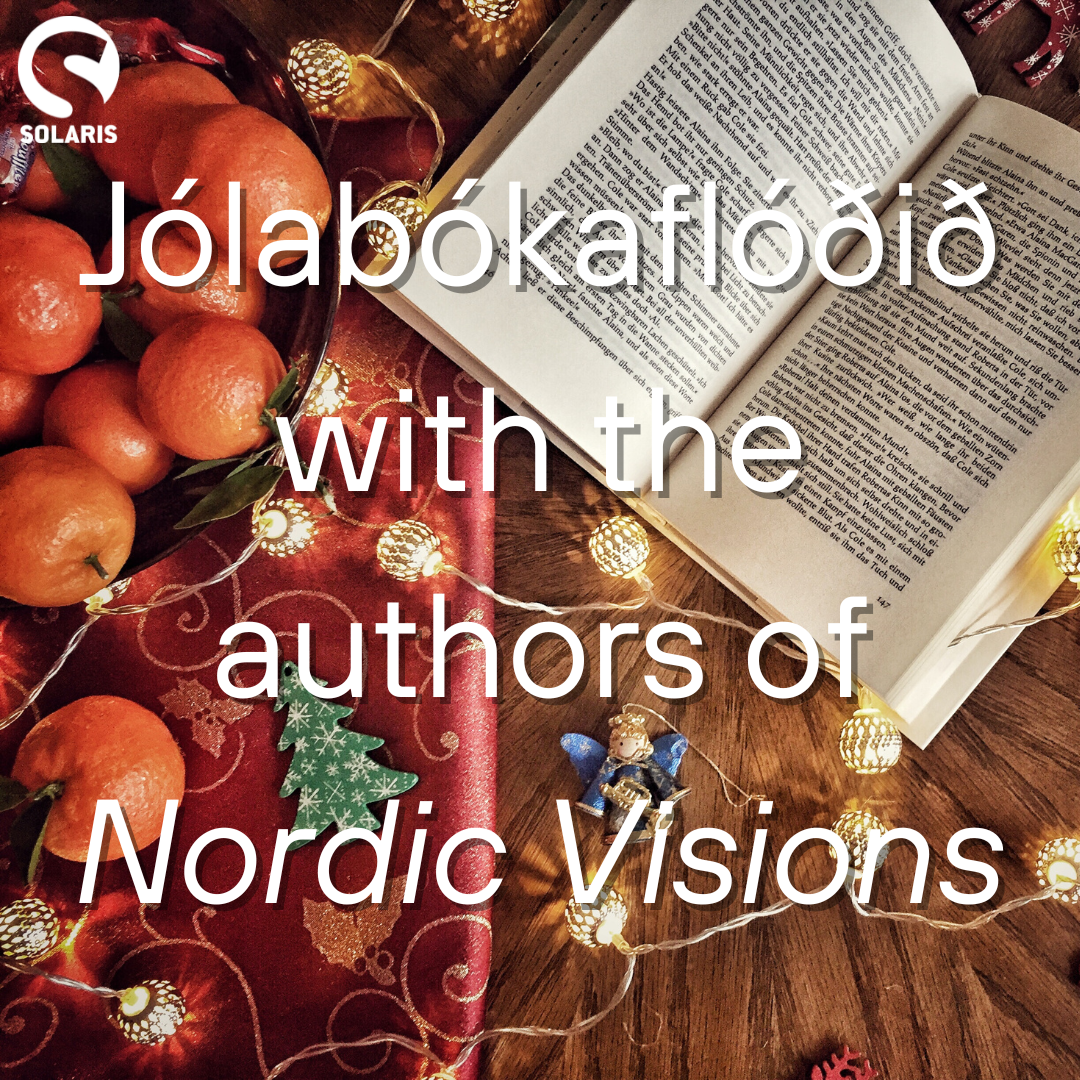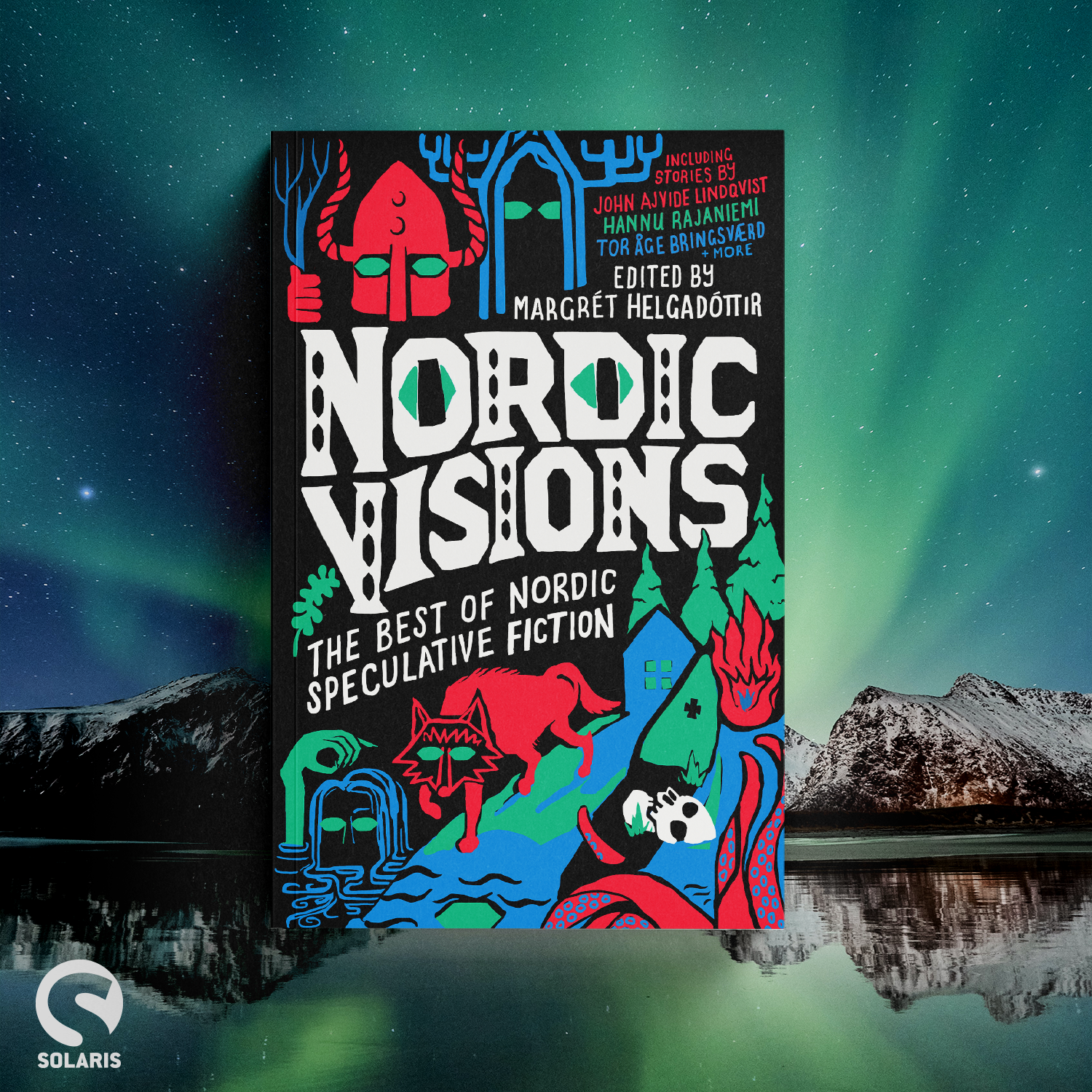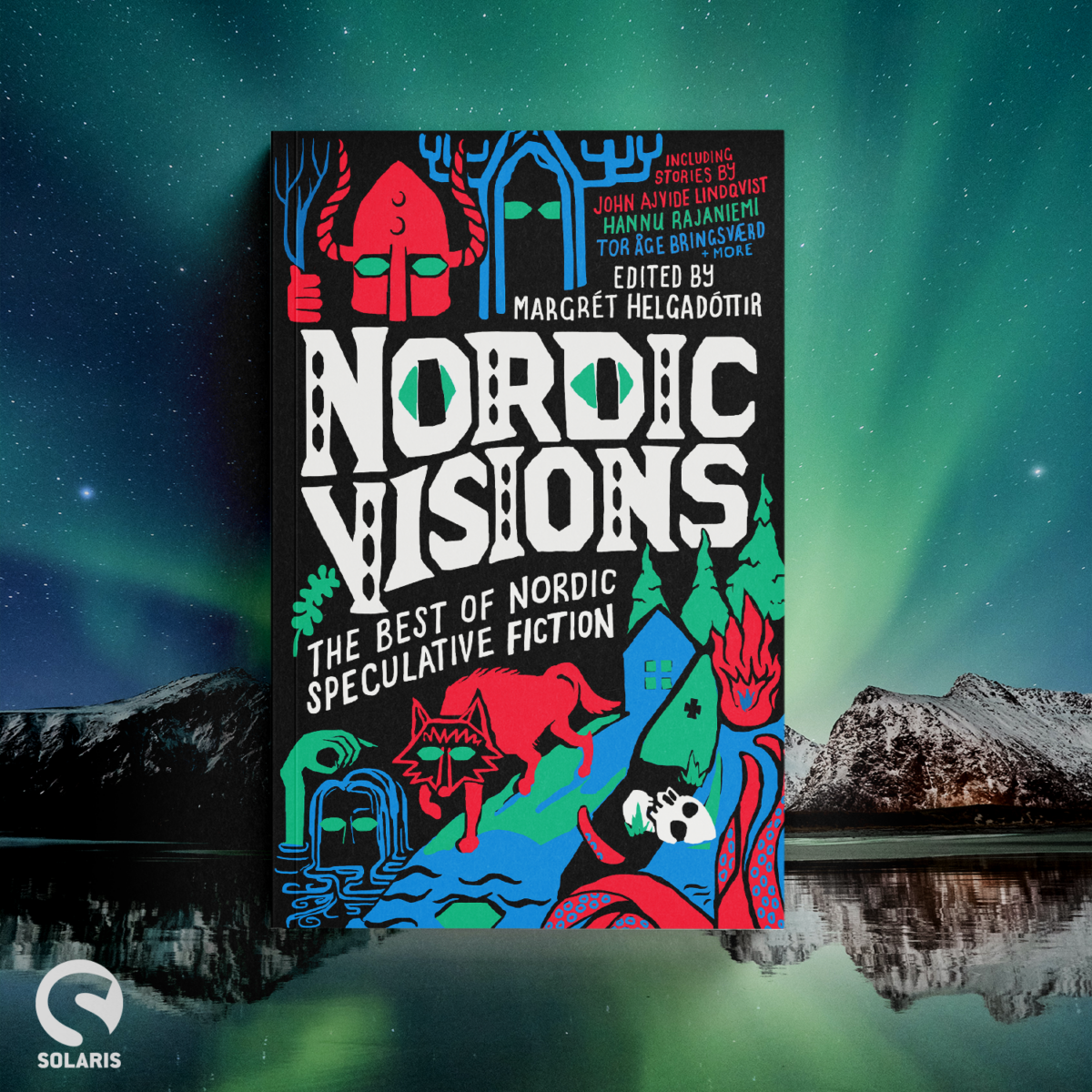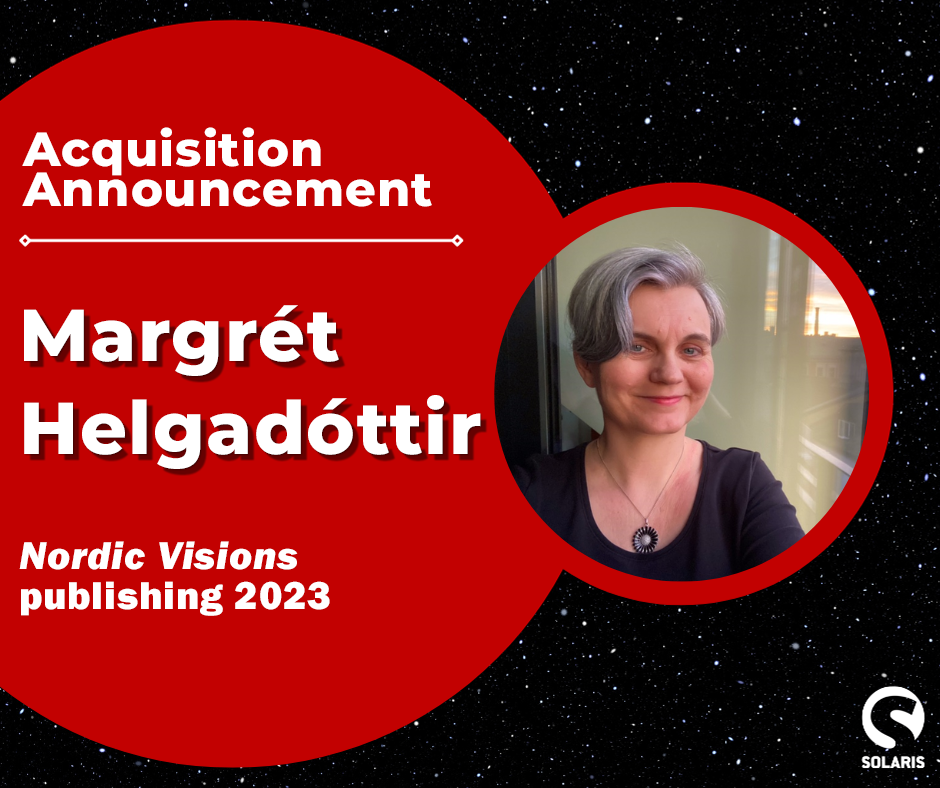
Jólabókaflóðið, or the Yule book flood, is the annual release of books in Iceland in the months leading up to Christmas, a tradition where many people in Iceland are gifted new books that they curl up with on Christmas Eve. Not a bad tradition at all, in our humble opinion!
We brought a selection of translated speculative stories from the Nordic countries to English-speaking readers this year in Nordic Visions: The Best of Nordic Speculative Fiction ed. by Margrét Helgadóttir. To celebrate the festive season, we asked Margrét and some of the contributors to tell us about Jólabókaflóðið and a time when they’ve gifted, or been gifted, a memorable book at Christmas…
Alexander Dan Vilhjálmsson, author of “Hamraborg Babylon”
In Iceland, the Yule Cat eats you if you don’t get any new clothes for Christmas. This fact of life is known to us from a young age. When I was growing up, I sometimes wondered if the Yule Cat’s appetite might have changed since the old days. I never felt as much at risk of being devoured by a monstrous feline as those rare occasions when I didn’t get a book for Christmas.
People say we started this tradition because of shortage in the latter world war. Books were something we could produce, and from then on almost everyone gets one for Christmas. Today, the tradition is so well-established that we call it the Christmas Book Flood and try to get anyone that’s willing to listen aboard.
The publishers get really stressed at the beginning of autumn, some still putting finishing touches on the last manuscripts being sent out (yes, things can happen too fast in Iceland). The introverted authors all get kicked out into the world to do marketing. Poor, wretched things. At least we’re all in it together. “Being in the flood” as an author brings with it its own unique frantic energy, running between readings or lectures or whatever it is you find yourself doing to promote. Inevitably, you get sick of yourself and your own words and voice. Then it’s good to have other writers with you in the trenches. If only to bitch and moan about everything and nothing to each other.
There is something about reading the first few pages of a new book on Christmas Eve before you go to bed. (That’s when we open the presents, by the way, none of this morning nonsense.) It’s a ritual that’s become so sacred to me that I make sure I always do have a new book ready on Christmas Eve – just in case I’m not gifted one. Then I can tell the Yule Cat it was a gift to myself.
The Flood also sweeps you up. Few can resist such a current. As autumn fades and winter darkness tightens its grip, you get the hankering to read all the new novels the authors and publishers are so frantically trying to market (that hard work pays off, evidently). And it’s really great to get a “December book” (or two). Farewell, I’ll see the sun come spring. Now is the time for reading.
But people do worry. About reading, literacy, the Icelandic language. And they have reason to. Still, all in all, the Flood still flows fairly strong, resulting in me still feeling like a giant monster should eat me if I don’t get a book. A fairly healthy notion, in my opinion.
Maybe you should also fear the Yule Book Flood Cat. Have an unopened book ready on your bedside table, just in case. Look carefully and you might catch it eyeing you through the window, licking its chops, slit pupils expanding like spilled ink on paper.
There, there. Nothing to fear, with a book in hand. Something to stave off the darkness. With it, the spring sun will rise before we know it.
Margrét Helgadóttir
I have been fortunate to receive books as Yule gifts over the many years, and I know I—when a child—sometimes would sneak away to some hidden corners for a quiet reading time, to recover after all the noisy fuss of the family dinner party. My family has lived all over and so I have also received books in several languages.
My brother gave me Ernest Hemingway’s The Old Man and The Sea in Danish many years ago, when he lived in Denmark and I was around 20, I think. I had not read much, if any, Hemingway at that time. I’m happy that this novel was my introduction to his work. Such a great tiny story about the stubborn fisherman and his battle with a great fish over many days.
Today I’m a big fan of Hemingway’s unique writing style, how he could tell epic stories with so few words, and the way he used facts in his work. For me as a writer, Hemingway has been one of the authors whose prose I can only gasp at, it sets such a high level of quality. If feeling low, I will excuse myself with “Well, I’m not Hemingway …”.
Such is the power of Yule gifts, they have a huger impact than you’d think.
Johanna Sinisalo, author of “A Bird Does Not Sing Because It Has an Answer”
I have several loved ones who not just enjoy literature but are or would like, one day, to be writers themselves. One Christmas I gave everyone of them Rabbit Back Literary Society by Finnish writer Pasi Ilmari Jääskeläinen. This is his first novel, but as he already was an experienced and awarded short story author, I could expect quality, and that I got: this far, his works have been translated into 15 languages and still counting.
Rabbit Back Literary Society tells a wintery twinpeaksian tale about a small Finnish community boasting an unlikely amount of talented writers. Ella, a young teacher, is invited to their prestigious society, and soon she begins to find out that something very weird is going on in Rabbit Back. What has happened to Laura White, the leading lady of the Society? Why are the written books changing in mysterious ways? And then there is The Game the writers are playing – feared, cruel, unavoidable.
Rabbit Back Literary Society is kind of a horror story, but quite down-to-earth, even funny, and between its lines the novel manages to discuss and comment the process of writing in a disturbingly accurate way. Finnish Weird at its best!
Jakob Drud, author of “Heather Country”
About fifteen years ago, my brother had just graduated as a philosophy major, and since he was clearly interested in what makes humans tick, I wanted to introduce him to Terry Pratchett’s Discworld series. I’d read most of the series and laughed a lot at the way Going Postal handled old mail-related themes. It also didn’t require knowledge of the other books, so it seemed a good place to start the series. One online order later, I had a gift to wrap, and he had a gift to open. He read it and liked it.
The following Christmas, I thought, why not give him another Pratchett novel? Not a bad idea after last year’s success, right? And with so many hilarious Discworld books to choose from, nothing could possibly go wrong, could it?
Except, of course, that I happened to buy him Going Postal a second time.
He did laugh when he unwrapped it, though.
Karin Tidbeck, author of “Sing”
My father is notoriously difficult when it comes to Yule gifts. He loves books, to the point where he just crammed a fifteenth bookcase into his apartment. He’s always reading and will devour everything from philosophy to biographies to fiction. Naturally, the perfect gift is a book. But because he’s always reading, it’s very hard to find something fitting that he hasn’t already consumed. But we have a common interest: medical mysteries and adventures. He’s a doctor and his books on pathology were at eye level when I was a child. Those and my mother’s Stephen King novels made me a macabre child. Last Yule, I found a book called Allt är gift (Everything Is Poison) by chemistry professor Olle Matsson and sneakily inferred that my father hadn’t read it. He loved it. It’s a history of 30 different poisons that have changed history, rich with anecdotes and interesting facts. I got him another book on poison murders for his birthday. It’s just a way of saying “I love you and will steal the book after you’re done so we can talk about cyanosis over coffee”.
Maria Haskins, author of “Lost and Found”
Many years ago my dad gave me a copy of The Count of Monte Cristo that he found in a Swedish antikvariat, AKA a store that sells old books. It’s an illustrated edition, in Swedish translation, from 1899. It’s a heavy, thick book, its pages thin and yellowed, the print small and shapely, the illustrations plentiful and exquisitely detailed. Likely, this book is the oldest thing I own, and it’s not at all in pristine condition. The red, black, and gold binding is worn, and some of the pages are loose, but the book is still beautiful and I have read and re-read it more times than I can remember. It remains one of my all-time favourite books, and one of my favourite possessions. These days, I have an ebook copy of the English translation as well, but nothing really compares to reading that dusty-smelling old tome.
Tone Almhjell, author of “The Cormorant”
My excellent brother came to books quite late, in his twenties. But when he did, he became every writer’s dream reader. You know, the kind who stops every few pages to stare into the distance and really think things through – ideas, consequences, character development. Eivind is just always ready to have his mind boggled. Therefore, one Christmas about ten years ago, I gave him a little library of the mind-boggliest kind: science fiction books.
Most of them were preloved paperbacks from my own shelves, like an omnibus from the Vorkosigan Saga by Lois McMaster Bujold. Some were childhood obsessions, like Dune. Some were classics, like Do Androids Dream of Electric Sheep?, Solaris, and Childhood’s End. There were short story collections, alternative histories, some cyberpunk. My brother’s favourite so far – he’s still slowly working his way through the pile – is Ringworld by Larry Niven, because of the awesome concepts. Like speaking in chords! It’s the gift that I can keep on giving. Maybe some Becky Chambers and Martha Wells this year?
Emmi Itäranta, author of “The Wings that Slice the Sky”
When I think of my childhood Christmases, I think of the scent of a pine tree – we always had a real one, as my mother disliked plastic – and the pile of books unwrapped from their shiny paper, waiting to be cracked open like portals to new worlds. My younger brother and I were allowed to bring our mattresses to the living room and sleep under the Christmas tree, and stay up reading as late as we liked: an exception not permitted at any other time of the year.
Detective stories were my favourites. Any present-giver could not go wrong with Nancy Drew (whose first name was Paula in the Finnish translations, presumably because Nancy was considered too foreign – imagine my shock when I learned years later that in English she was known as Nancy!) or The Dana Girls.
Like most readers, I grew out of these formulaic mysteries at some point and purged the volumes from my home library, so sadly none of them remain on my shelves. But they formed an integral part of my childhood: eating chocolate and going on adventures forged from words in the middle of dark winter nights under the Christmas tree.


